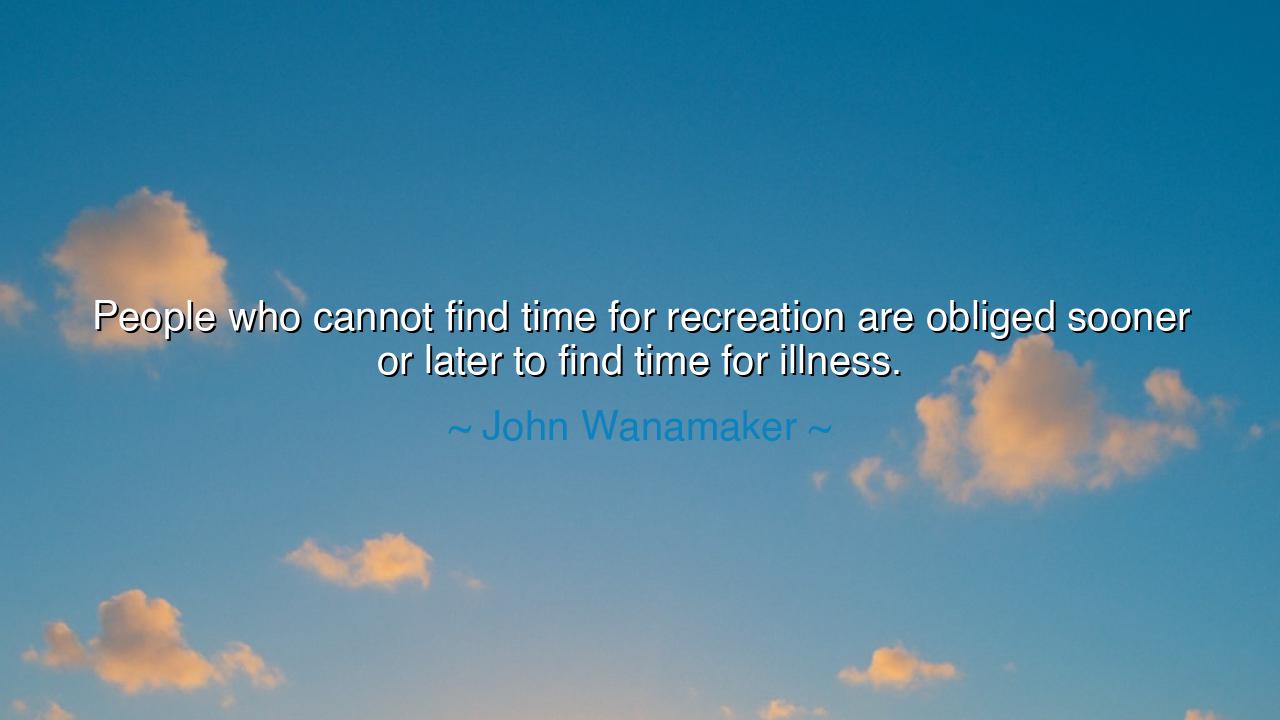
People who cannot find time for recreation are obliged sooner or
People who cannot find time for recreation are obliged sooner or later to find time for illness.






The merchant prince and statesman, John Wanamaker, who built great empires of trade yet never forgot the rhythms of human life, once spoke with stern clarity: “People who cannot find time for recreation are obliged sooner or later to find time for illness.” In this, he warned that life cannot be lived as unending toil. The body, the mind, and the spirit demand balance, and if one refuses to give them rest through joy and recreation, then they will take their revenge in the form of weakness, weariness, and sickness. What is neglected in peace must be paid in suffering.
The origin of this truth lies in Wanamaker’s life as both a businessman and a public servant. He understood that industry and ambition were noble, but he also saw the dangers of relentless labor. The world of commerce, then as now, praised the man who never ceased working. Yet Wanamaker, with a wisdom born of both faith and observation, declared that time spent in play, in nature, in art, in fellowship, was not wasted—it was an investment in health, vitality, and longevity. He spoke as one who knew that recreation is not luxury but necessity.
The ancients bore witness to the same truth. The Romans coined the phrase mens sana in corpore sano—“a sound mind in a sound body.” The Greeks celebrated the balance of work, philosophy, and athletics, knowing that harmony of body and soul produced strength. Even the Scriptures themselves speak of sabbath, a divine rhythm of rest without which man destroys himself. Wanamaker’s warning echoes these eternal voices: if we will not rest by choice, we will be forced to rest by compulsion.
History gives us vivid examples. Consider the tale of Florence Nightingale, who, though she dedicated her life to saving others, often drove herself beyond her own limits. At times, exhaustion and illness nearly silenced her work. Or think of the modern case of Steve Jobs, whose tireless brilliance reshaped the world of technology, yet whose body gave way under the burden of disease. These lives remind us that genius and effort, without balance, exact a terrible cost. Health is the foundation of all achievement, and it cannot be purchased once lost.
The meaning of Wanamaker’s words is therefore not simply practical, but moral. He teaches us that to neglect rest, to deny ourselves the refreshment of joy, is an act of ingratitude toward the gift of life itself. It is to live in arrogance, imagining we are machines rather than mortal beings. Illness becomes the tutor of those who will not learn the gentler lessons of recreation. And thus the wise man chooses recreation not as an escape from life but as a way of sustaining it.
Therefore, the lesson is clear: honor the rhythm of rest. Do not boast of endless labor, for it is no true glory to collapse under its weight. Instead, make time for laughter, for walks under the sky, for play with children, for music and companionship. These are not wasted hours, but sacred hours, in which the body is renewed, the mind is restored, and the soul is healed. Recreation is the soil in which vitality grows.
In practice, I counsel this: carve out regular time for activities that bring joy and peace. Set aside hours each week for recreation as deliberately as you set aside hours for work. Guard these times, for they guard your very health. And when guilt whispers that you are wasting time, remember Wanamaker’s warning: the time you do not give to recreation will one day be taken from you by illness.
Thus, hold fast to the wisdom of John Wanamaker: “People who cannot find time for recreation are obliged sooner or later to find time for illness.” Let it remind you to live in balance, to cherish your health, and to walk the path of wholeness. For in rest as in labor, in joy as in duty, life finds its fullness, and man becomes what he was meant to be—strong, whole, and alive.






AAdministratorAdministrator
Welcome, honored guests. Please leave a comment, we will respond soon